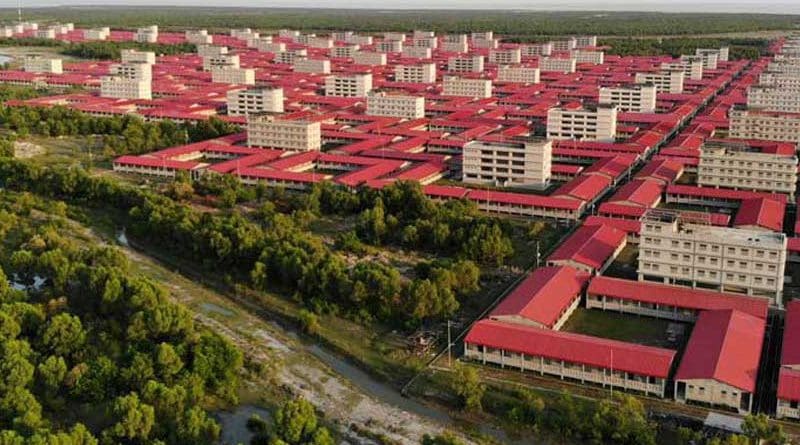Why UNHCR Should Start Releasing Funds For ‘Relocated’ Rohingyas In Bhashan Char – OpEd
Last year on October 09, 2021, the United Nations (UN) and Bangladesh signed a Memorandum of Understanding (MoU) for humanitarian response to Rohingyas in Bhashan Char. The agreement allowed room for close cooperation between the Government and the UN agencies on services and activities for the betterment of the Rohingyas living on the island. These cover the areas of livelihoods, skills training, education, health, and overall protection to support them in improving living standards and better preparing for a “sustainable return” to Myanmar in the future. However, seven months have passed and the UNHCR is yet to materialize the commitment.
The Russian invasion in Ukraine is intensifying, contributing to over 7 million Refugees to the existing 5 million Refugees around the world. The Ukraine crisis has attracted all the attention that the Rohingya crisis has been side-lined to some extent. Since the major exodus in 2017, more than 1.1 million Rohingyas have been living in the overcrowded camps in Cox’s Bazar district of Bangladesh. With the protracted situation due to failed repatriation attempts contributes to deteriorating the camp’s security and the host versus Rohingya tension is increasing at an alarming rate. Lured by criminal groups and human traffickers, many Rohingyas are involved in various criminal activities, drug peddling, and radical extremist activities that pose a critical security threat for Bangladesh and for South Asia too.
To improve the security situation and the living conditions of the Rohingyas, Bangladesh decided to temporarily relocate one-tenth of the Rohingyas living in the camps of Cox’s Bazar to the Bhashan Char Island. Though the project was approved in November 2017, the first batch of relocations occurred in December 2020 amid speculations about the sustainability of the island. One and half years after the relocation started, around 28,000 Rohingyas have been transferred to Bhashan Char in the hope of improving their living standards and making them prepare for the repatriation.
Bangladesh spent over US $360 million to build the infrastructure of 120 cluster houses across the 13,000-acre island to accommodate more than 100,000 people. Besides, the government of Bangladesh launched a project to provide 5,000 Rohingya refugees with essential tools to earn a living after relocating them In the first phase of the project on July 2021, around 2,800 Rohingyas were provided with fishing nets, rickshaw vans, poultry, cobbler tools, sewing machines, and repair equipment for financial independence where they primarily rely on government handouts and foreign aid for survival. The living standards will be even better and continued when the United Nations begins humanitarian operations there.
After the commitment of UNHCR in October last year, as the first country —Japan, a trusted and all-weather friend of Bangladesh, extended an emergency aid grant of US $2 million to the UNHCR and the UN World Food Programme (WFP) to complement the humanitarian response in Bhashan Char and to support the urgent needs of Rohingyas living on the island. During the recent visit of USAID Deputy administrator Isobel Coleman to Bangladesh from 7-11 May 2022, she assured, as USAID does not provide direct assistance, it will increase funding for the UNHCR and the WFP for providing facilities there. However, except for assurance, no aid or humanitarian support has not provided to the relocated refugees in Bhashan Char. In the absence of the UN agencies, more than 40 local NGOs are now providing humanitarian support.
Though some international organizations and NGOs criticized the decision, after several visits and close monitoring, the UNHCR committed to starting their aid operations in the Bhashan Char. During the visit of the UN Deputy High Commissioner for Refugees Kelly T Clements in February 2022, she praised the initiative of making Bhashan Char a “temporary stay” for the Rohingyas. She reaffirmed the commitment to start their humanitarian operational activities there without delay. However, still they did not start their operation there. It’s the moral right of the Rohingyas who are staying there to get the facilities of UNHCR. The humanitarian support should be continued until the Rohingyas are able to return to Myanmar in a safe, voluntary, and sustainable manner, which remains a shared priority of the Rohingyas in the country, the Government of Bangladesh, and the UN.
The bottom line is that since the military coup d’état on February 1, 2021, the hope for the safe and dignified return of the Rohingyas has been blurred to a larger extent. In this circumstance, it is assumed that the Rohingya crisis seems to be more protracting and the continuity of humanitarian support for the Rohingyas in Cox’s Bazar and Bhashan Char should be a primary concern. The sooner the UN agencies will engage in the common protection and policy framework in the Bhashan Char, the better it will be for the world’s poorest and most persecuted refugees worldwide.
*Shaikh Abdur Rahman is a researcher at the Central Foundation for International and Strategic Studies (CFISS) based in Dhaka. He writes on South Asia’s politics, human security issues and economic diplomacy, with a particular focus on Bangladesh’s foreign policy. He finished his master’s in international relations from the University of Rajshahi, Bangladesh. His work has been appeared in the LSE blog, The Diplomat, East Asia Forum, Eurasia Review, Modern Diplomacy and many other publications.

